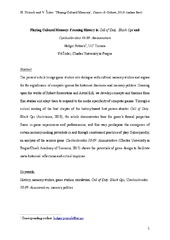Playing Cultural Memory: Framing History in 'Call of Duty: Black Ops' and 'Czechoslovakia 38-89: Assassination'
Permanent link
https://hdl.handle.net/10037/10439Date
2016-03-21Type
Journal articleTidsskriftartikkel
Peer reviewed
Abstract
The present article brings game studies into dialogue with cultural memory studies and argues for the significance of computer games for historical discourse and memory politics. Drawing upon the works of Robert Rosenstone and Astrid Erll, we develop concepts and theories from film studies and adapt them to respond to the media specificity of computer games. Through a critical reading of the first chapter of the history-based first-person shooter Call of Duty: Black Ops, the article demonstrates how the game’s formal properties frame in-game experiences and performances, and this way predisposes the emergence of certain memory-making potentials in and through constrained practices of play. Subsequently, an analysis of the serious game Czechoslovakia 38-89: Assassination shows the potentials of game design to facilitate meta-historical reflections and critical inquiries.
Description
Accepted manuscript version. Published version available at http://dx.doi.org/10.1177/1555412016638603


 English
English norsk
norsk